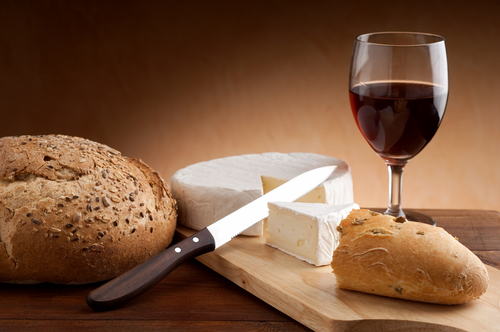
10 Apr Drawing Parallels Between Bread and Wine
Few food and drink options go even more back than beer, cheese, bread, and wine. Our bodies require nourishment, and these foods have actually been staples for centuries. And whether you’re a vintner, a beer cheesemonger, maker, or baker, you can value the process of taking something in one state and shepherding it through the procedure of becoming something else.
Peter Reinhart explains bread as a transformational food. It starts as something dead (flour that was ground from wheat kernels), becomes enlivened once yeast is contributed to it, and then passes away once again when baked in the oven. If bread and wine have parallels, we might definitely make a connection in between fermentation, periods of rest and” aging” for richer flavor, and that these two day-to-day-living routines for neighborhoods and families have existed for centuries.
If you’ve never ever been one to venture far into the kitchen, you may buy all your bread, or simply leave the baking to your father or granny. In layperson’s terms, here are some particular methods that bread and wine are similar.
1. Gathering grapes is a bit of a science, as wine makers will carefully keep an eye on grapes to identify their sugar levels. Sugar levels and temperature level identify when it’s time to harvest. With wheat, you harvest it and take the kernels (the seeds) and grind them into flour.
2. There’s a mixing that decreases. Once the grapes have been crushed to extract their juice, wine makers will add yeast to leap start the fermentation procedure that eventually renders the juice alcoholic. In like way, you have to take the gathered wheat, grind it into flour, and then add yeast, salt, and water to start the process of making tasty bread.
3. There are resting durations required for both and you can’t rush them. If you include yeast to flour and then reverse and bake the bread immediately, the bread will be dense as a rock. And without enabling wine to ferment correctly, you will not get the alcohol that you long for. Resting is necessary.
4. Both are separated into smaller sized portions and allowed to rest again. Wine, once it has actually rested and fermented an initial time, often ages in barrels in wine cellars to accomplish the desired end-flavor outcome.
5. Lastly, we often spend a lot of loan on fine wine and great food. Because it tastes better, and most of value that.
But could there be another factor too? Could there be something to that we often have the tendency to equate rate with how excellent something is?
Surprisingly, Benjamin Wallace went on a mission to attempt to address the question of whether happiness was something that might be purchased– and if costly things were in fact worth exactly what they cost. A lot of people … said that they liked the more costly wine more– it was the same wine, but they believed it was a various one that was more costly. Exactly what was unforeseen was that these scientists did MRI brain imaging while the individuals were consuming the wine– and not just did they state they delighted in the more expensively identified wine more, their brain in fact registered as experiencing more satisfaction from the exact same wine when it was labeled with a greater cost tag.”
That’s type of a fascinating thing to think of, and it might cause all of us to think about if we tend to think something is much better if it costs more. In any case, hardly anything compares with a piece of fresh bread with butter or cheese and a glass of wine when you require some convenience and a possibility to unwind.
Whether you want to end up being much better familiarized with the delicious food this area has to use, or you’d like to take a wine trip with our charter bus Maine to try new varieties and discover more about the process, we are the folks you desire to call. Consuming is one of life’s simple pleasures, and these tours are one of the ways we facilitate that kind of delight.
The info for this post came from the following links:


No Comments